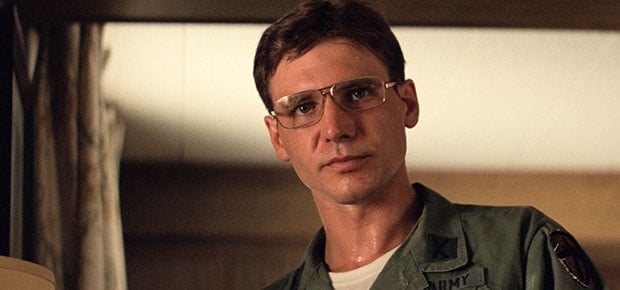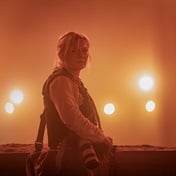
WHAT IT'S ABOUT:
Veteran army officer, Captain Benjamin Willard, is called back to duty during the height of the Vietnam War to track down and kill Colonel Walter Kurtz, a highly decorated war hero who has gone insane and appointed himself the murderous and despotic head of a cult-like tribe of Cambodian natives. A re-release of the 1979 classic, re-cut by its director and remastered for IMAX and 4K home releases.
WHAT WE THOUGHT:
It's tempting just to skip actually reviewing Apocalypse Now: The Final Cut and focus instead on its glorious restoration and the new edit of the film that is longer than the theatrical cut and shorter than the 2001 Redux version – or, as Francis Ford Coppola himself puts it, "the Goldilocks edit" because it's now "just right".
I'm not going to do that, though, because aside for the fact that reviewing the blasted thing is my job, it's rather presumptuous to assume that anyone born after, say, 1970 is all that familiar with the film beyond its towering stature in late 20th-century pop culture. Also, it's been years since I saw the Redux version and despite some criticisms that its bum-numbing 3.5-hour run-time was rather over-egging the pudding, I never really felt the need to go back and watch the apparently less- "weird" and less dream-like original.
Three-hours, as it turns out, though, really is "just right" for the film (even if we may quibble about which scenes should or shouldn't have been included) because even if I, for one, love the way the Redux cut really does feel like a proper journey, the Final Cut does actually strike a great balance between the meandering nature of Apocalypse Now: Redux and the relatively tighter original. This does, incidentally, mean that the infamous plantation scene and its tell-don't-show philosophy is even more of an anomaly here than it was in the Redux edit as the Final Cut's more consistent pacing leaves far less space for these sort of out-of-place indulgences.
That's about it for my complaints about the film, though. The first two Godfather films may be Coppola's best movies, but Apocalypse Now has always been his most audacious and, almost for that alone, I prefer it.
Here's the thing, though, if you are to have a hope in hell of even remotely enjoying, let alone loving Apocalypse Now, you need to understand both what it is and what it isn't. This was driven home with particular poignancy (and, yeah, a bit of laughter on my part) during the big, glitzy premiere of the film where a whole bunch of previously enthusiastic film-goers walked out of the film long before it ended.
Apocalypse Now is not, to put it bluntly, a war film. It's certainly not a mainstream war film. It's not even, in fact, an anti-war film. It certainly doesn't come down on the side of the Vietnam war, to be sure, but it clearly uses the idea that the Vietnam war was an idiotic and tragic mistake as a jumping off point rather than as a destination. What it is, is a highly stylised, fever-dream of an art film that uses one of the most hellish wars in recent history as an extended visual metaphor for a slow descent into darkness - with all the madness and evil that implies.
(Yes, yes, anyone who actually knows Apocalypse Now understands this as it is rather obvious as far as metaphors go, but this is addressed to those who only vaguely know of the film as "that war movie from the '70s" who may not be quite prepared for what it actually is)
The film starts with one of the greatest, most iconic openings in any movie ever as The Doors' epic, the End (see what they did there?) plays against the sight of military helicopters bombing the ever-loving hell out of a strip of Vietnamese jungle before we fade to Martin Sheen's Captain Willard in an oppressively hot, dingy soldier's quarters where, through noir-like voiceover (written separately from the rest of Copolla and John Milius' script by real-life war-correspondent, Michael Herr), he takes us into the mind of a soldier where any sense of belonging, any sense of home, is eroded until all that remains is a self-destructive need to get back to fighting, killing and maybe dying. Things only intensify from there as each encounter presents a reality even more insane and unhinged than the one before it until finally culminating in a nightmarish, shockingly brutal ending.
Taking the form of a road-trip movie, Apocalypse Now is filled with more classic cinematic touchstones than damn near any film this side of Casablanca. From unforgettable dialogue ("the horror, the horror", "I love the smell of napalm in the morning") to entire set pieces that have been reproduced wholesale over the decades in often wildly different contexts (my personal favourite: the season 4 finale of Buffy the Vampire Slayer), the quality of filmmaking here is as breathtaking as it ever was.
Because of its loose, road-trip structure and its notoriously difficult production, it's easy to overlook just how much order Coppola is able to draft onto the chaos around him as the entire film feels of a piece despite careening from laugh-out-loud comedy (everything to do with Duvall's Lieutenant Kilgore is deranged, but it's also genuinely funny, as is plenty of the dialogue throughout) to war-movie action to skin-crawling horror. And, of course, it's all tied together by the Oscar-winning cinematography of Vittorio Storaro and the peerless sound design that throws you right into the action. The film already looked and sounded amazing on my (late) fairly small, SD television; the experience is all but impossible to articulate when viewed, in its digitally remastered form, on an IMAX screen with Dolby Atmos surround sound.
Anchoring all this is the always spectacular Martin Sheen who, as Captain Willard, often has to tell us a lot by doing very little, even if his brilliantly realised voiceover does at least some of the heavy lifting. The supporting cast, including a very young Laurence Fishburne and (yes, this word again) iconic, increasingly unhinged turns from Robert Duvall, Dennis Hopper and, of course, Marlon Brando as Kurtz, are there to perfectly reflect the increasing madness going on in Willard's own mind – and they almost do too good a job of it.
Indeed, as a reflection of a descent into the darkness, the entire film almost does too good a job of it in general, which explains all the walkouts. Aside for being incredibly long (though, from my vantage point and aside for the plantation scene, somehow never boring), this is the sort of unflinching, visceral filmmaking that incrementally tightens its grip on you until it almost literally suffocates you in its crazed final half-hour. Apocalypse Now no doubt hit with a unique power back when it was released in edited-down form at the end of the 1970s and the ensuing four decades have done nothing to lessen its impact.
It's not for everyone but serious film fans of any age should do their utmost to make sure that they make full use of the limited, one-week-only IMAX release to see one of the greatest films ever made the way it really ought to be... not so much seen (one can't just "see" Apocalypse Now) as experienced.




 Publications
Publications
 Partners
Partners















